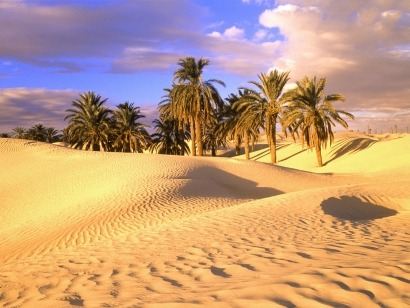
Using thousands of mirrors to track the Tunisian sun to use its heat to generate electricity, the TuNur Concentrating Solar-thermal Power (CSP) plants will ultimately produce 2 gigawatts of electricity, roughly double the average nuclear power plant. Project developer, Nur Energie, and its Tunisian partners led by Top Oilfield Services, plan to construct the project in several phases. The first phase is expected to begin in 2014 and the first electricity exports are set to reach Europe by 2016 via a new low-loss transmission line to Italy. The project has been designed to reduce water requirements to a bare minimum by using a dry, air-based cooling system.
"This is a time of great change in Tunisia and across North Africa, and it couldn’t be more appropriate to actively, and responsibly, invest in long-term projects in this emerging democracy now. Industrial investment for job creation is the most effective way to alleviate poverty and to provide opportunities for Tunisia’s young population. DESERTEC can really support this vision, and with our TuNur project we are taking a first concrete step in this direction," comments Fethi Somrani, CEO of the Tunisian partner, Top Oilfield Services.
The Desertec Foundation is endorsing TuNur and believes that it can serve as a blueprint for the development of further wind and solar projects in the Sahara for several reasons.
Firstly, the project will focus on maximising local value creation in Tunisia. It provides the country with the opportunity to begin building a new industrial sector, bringing investment, jobs, and thus economic development. Investment will mainly benefit the southern and interior parts of the country, which look set to become a priority area for development for the Tunisian government. The number of jobs created directly and indirectly over the project’s construction and operational period will come to around 20,000.
As well as relying on local partners and management for project development and local engineering firms, the project will also create new manufacturing industries. For example, around 825,000 flat plate mirrors and steel structures known as heliostats will be needed for the 2 Gigawatt project and can be manufactured locally.
TuNur demonstrates Desertec’s conviction that investing in renewables where those energy sources are most abundant is the most effective way of protecting the climate. In Tunisia, space is more abundant and the solar radiation is up to three times that of Central Europe. Plants built in such optimal locations produce more electricity and have the potential to replace more conventional, carbon-intensive forms of power. TuNur can provide predictable power production to electricity grids with fluctuating energy sources such as photovoltaic and wind power. Using heat storage tanks, TuNur can produce electricity on demand day and night, delivering enough clean electricity to power 700,000 European homes.
"The project has been evaluated by a team of independent experts and, based on their review of the development work so far, it meets our criteria for an official Desertec Project. TuNur will benefit Tunisia by creating jobs and spurring investments in local education to aid the long term management of the plants after 2016. We will keep a close eye on developments to ensure the socio-economic benefits for Tunisians are maximized and that TuNur embodies the principles of the Desertec Concept,” explains Director Desertec Foundation, Dr Thiemo Gropp. “With this important first step, we are showing the world’s governments, industries and consumers that what many thought to be science fiction is actually science fact. We hope that this is the first of many more such plants to be built in the desert regions of the world."
"TuNur is going to be the blueprint for things to come. It is a pioneering project that other governments, companies and individuals can point to and say, “Solar energy export from North Africa to Europe is possible, it’s worthwhile and the DESERTEC vision is attainable”. We are used to transporting exhaustible fuels like oil and gas thousands of kilometers and then burning them close to our cities with all the associated pollution problems and other risks to humans and our environment. Now, with the TuNur project, we are turning away from these polluting fuels to transmit clean and inexhaustible energy from the heart of the desert to European homes whilst, at the same time, bringing jobs, economic development, and export revenue to Tunisia," says Nur Energie’s Chief Executive Officer, Kevin Sara.
For additional information:

